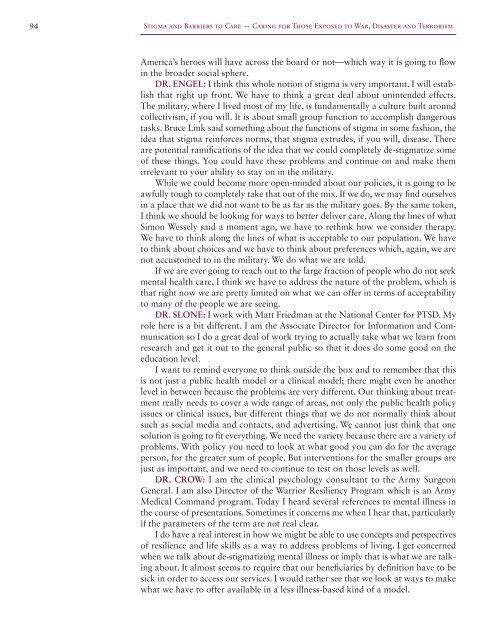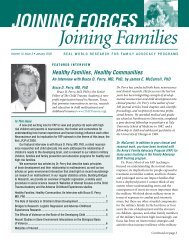stigma and barriers to care - Uniformed Services University of the ...
stigma and barriers to care - Uniformed Services University of the ...
stigma and barriers to care - Uniformed Services University of the ...
You also want an ePaper? Increase the reach of your titles
YUMPU automatically turns print PDFs into web optimized ePapers that Google loves.
94<br />
Stigma <strong>and</strong> Barriers <strong>to</strong> Care — Caring for Those Exposed <strong>to</strong> War, Disaster <strong>and</strong> Terrorism<br />
America’s heroes will have across <strong>the</strong> board or not—which way it is going <strong>to</strong> flow<br />
in <strong>the</strong> broader social sphere.<br />
DR. ENGEL: I think this whole notion <strong>of</strong> <strong>stigma</strong> is very important. I will establish<br />
that right up front. We have <strong>to</strong> think a great deal about unintended effects.<br />
The military, where I lived most <strong>of</strong> my life, is fundamentally a culture built around<br />
collectivism, if you will. It is about small group function <strong>to</strong> accomplish dangerous<br />
tasks. Bruce Link said something about <strong>the</strong> functions <strong>of</strong> <strong>stigma</strong> in some fashion, <strong>the</strong><br />
idea that <strong>stigma</strong> reinforces norms, that <strong>stigma</strong> extrudes, if you will, disease. There<br />
are potential ramifications <strong>of</strong> <strong>the</strong> idea that we could completely de-<strong>stigma</strong>tize some<br />
<strong>of</strong> <strong>the</strong>se things. You could have <strong>the</strong>se problems <strong>and</strong> continue on <strong>and</strong> make <strong>the</strong>m<br />
irrelevant <strong>to</strong> your ability <strong>to</strong> stay on in <strong>the</strong> military.<br />
While we could become more open-minded about our policies, it is going <strong>to</strong> be<br />
awfully <strong>to</strong>ugh <strong>to</strong> completely take that out <strong>of</strong> <strong>the</strong> mix. If we do, we may find ourselves<br />
in a place that we did not want <strong>to</strong> be as far as <strong>the</strong> military goes. By <strong>the</strong> same <strong>to</strong>ken,<br />
I think we should be looking for ways <strong>to</strong> better deliver <strong>care</strong>. Along <strong>the</strong> lines <strong>of</strong> what<br />
Simon Wessely said a moment ago, we have <strong>to</strong> rethink how we consider <strong>the</strong>rapy.<br />
We have <strong>to</strong> think along <strong>the</strong> lines <strong>of</strong> what is acceptable <strong>to</strong> our population. We have<br />
<strong>to</strong> think about choices <strong>and</strong> we have <strong>to</strong> think about preferences which, again, we are<br />
not accus<strong>to</strong>med <strong>to</strong> in <strong>the</strong> military. We do what we are <strong>to</strong>ld.<br />
If we are ever going <strong>to</strong> reach out <strong>to</strong> <strong>the</strong> large fraction <strong>of</strong> people who do not seek<br />
mental health <strong>care</strong>, I think we have <strong>to</strong> address <strong>the</strong> nature <strong>of</strong> <strong>the</strong> problem, which is<br />
that right now we are pretty limited on what we can <strong>of</strong>fer in terms <strong>of</strong> acceptability<br />
<strong>to</strong> many <strong>of</strong> <strong>the</strong> people we are seeing.<br />
DR. SLONE: I work with Matt Friedman at <strong>the</strong> National Center for PTSD. My<br />
role here is a bit different. I am <strong>the</strong> Associate Direc<strong>to</strong>r for Information <strong>and</strong> Communication<br />
so I do a great deal <strong>of</strong> work trying <strong>to</strong> actually take what we learn from<br />
research <strong>and</strong> get it out <strong>to</strong> <strong>the</strong> general public so that it does do some good on <strong>the</strong><br />
education level.<br />
I want <strong>to</strong> remind everyone <strong>to</strong> think outside <strong>the</strong> box <strong>and</strong> <strong>to</strong> remember that this<br />
is not just a public health model or a clinical model; <strong>the</strong>re might even be ano<strong>the</strong>r<br />
level in between because <strong>the</strong> problems are very different. Our thinking about treatment<br />
really needs <strong>to</strong> cover a wide range <strong>of</strong> areas, not only <strong>the</strong> public health policy<br />
issues or clinical issues, but different things that we do not normally think about<br />
such as social media <strong>and</strong> contacts, <strong>and</strong> advertising. We cannot just think that one<br />
solution is going <strong>to</strong> fit everything. We need <strong>the</strong> variety because <strong>the</strong>re are a variety <strong>of</strong><br />
problems. With policy you need <strong>to</strong> look at what good you can do for <strong>the</strong> average<br />
person, for <strong>the</strong> greater sum <strong>of</strong> people. But interventions for <strong>the</strong> smaller groups are<br />
just as important, <strong>and</strong> we need <strong>to</strong> continue <strong>to</strong> test on those levels as well.<br />
DR. CROW: I am <strong>the</strong> clinical psychology consultant <strong>to</strong> <strong>the</strong> Army Surgeon<br />
General. I am also Direc<strong>to</strong>r <strong>of</strong> <strong>the</strong> Warrior Resiliency Program which is an Army<br />
Medical Comm<strong>and</strong> program. Today I heard several references <strong>to</strong> mental illness in<br />
<strong>the</strong> course <strong>of</strong> presentations. Sometimes it concerns me when I hear that, particularly<br />
if <strong>the</strong> parameters <strong>of</strong> <strong>the</strong> term are not real clear.<br />
I do have a real interest in how we might be able <strong>to</strong> use concepts <strong>and</strong> perspectives<br />
<strong>of</strong> resilience <strong>and</strong> life skills as a way <strong>to</strong> address problems <strong>of</strong> living. I get concerned<br />
when we talk about de-<strong>stigma</strong>tizing mental illness or imply that is what we are talking<br />
about. It almost seems <strong>to</strong> require that our beneficiaries by definition have <strong>to</strong> be<br />
sick in order <strong>to</strong> access our services. I would ra<strong>the</strong>r see that we look at ways <strong>to</strong> make<br />
what we have <strong>to</strong> <strong>of</strong>fer available in a less illness-based kind <strong>of</strong> a model.




